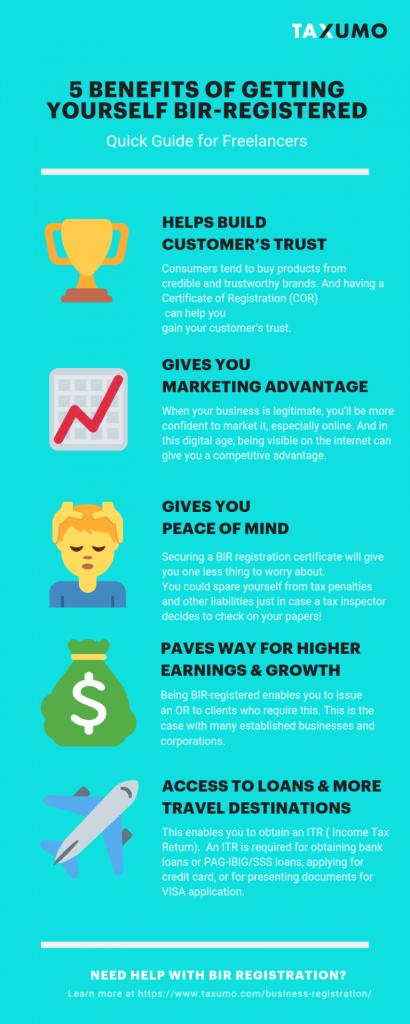Freelancing can be a life-changing experience. You get to enjoy cool perks like having control over your income and independence. But when it comes to BIR online filing, you might have lots of questions to ask.
Registering your gig with the BIR is an absolute must if you want your career or business to operate without any hitch. Besides, paying taxes is one of your obligations as a Filipino citizen.
Why should I pay taxes? For VISA Application, Credit Card and HMO application, Loans, etc., you will need copy of your Tax Forms (1701Q or 1701).
How to get an ITR as a Freelancer?
Registering yourself as a Filipino Freelance Professional is a very manual process though.
Professional
Online freelancers usually fall under the Professional category. Some examples of professional freelancers include Blog writers, Virtual assistants, Graphic Designers, Health and wellness coaches, etc.
Here are the steps to registering your gig with the BIR.
1. Secure a Tax Identification Number or TIN.
2. Prepare the necessary requirements.
- NSO birth certificate
- PRC ID
- Professional Tax Receipt (PTR – for licensed professions under the Philippine Regulatory Commission) or Occupational Tax Receipt (OTR – for professions where PTR is not required.) from the Barangay
- Barangay Clearance
- Marriage contract
- DTI certificate of business name (optional but not required)
NEED HELP REGISTERING AS A PROFESSIONAL?
CHECK OUT TAXUMO’S BUSINESS REGISTRATION SERVICES
3. Obtain a BIR Form 1901 and submit it with the requirements above to the RDO.
4. Pay the annual registration fee of P500.00 at BIR or any authorized banks.
5. Submit the documents and pay the P15 certification fee and the P15 documentary stamp tax.
6. Attend the taxpayer’s briefing for new registrants, which will be conducted by the RDO.
7. After this, the RDO will give you the Certificate of Registration or Form 2303. You will also receive the “Ask for Receipt” notice, Authority to Print (ATP), and Books of Accounts. Take note that your registration of books of accounts must be stamped by the RDO.
Sole Proprietor
If your business is similar to selling products like baked goodies and clothing, then you fall under the Sole Proprietor Category.
Here’s how you can register as a sole proprietor.
- Register your business name at DTI.
- Go to the Barangay hall where your business is located. Get a Barangay Business Clearance.
- Go to the Municipal Hall / City Hall (LGU) and fill up an application form and submit it together with your DTI Certificate, Barangay Business Clearance two valid IDs, and proof of address such as Contract of Lease or Certificate of Land Title.
- Here, you also have to secure licenses and permits from Municipal Health Office, Bureau of Fire and Protection, Municipal Planning & Development Coordinator, and Office of the Municipal Engineer.
- Head to BIR and register your business. Fill up the BIR Form 1901 and pay the 500 annual registration fee to authorized agent bank using BIR Form 0605.
- You will now have your BIR Certificate of Registration (BIR Form 2303), Notice to the Public “Ask for Receipt” signage, and Stamped annual registration fee for the current year (BIR Form 0605).
NEED HELP REGISTERING AS A SOLE PROPRIETOR?
CHECK OUT TAXUMO’S BUSINESS REGISTRATION SERVICES
You only need to do this once unless you change your freelancing services or business. Luckily, you can now manage your Taxes online with the help of online tools like Taxumo. Find out how you can efficiently manage your annual taxes with minimal effort here.
Still trying to convince yourself on why you should register? Here’s an infographic to help you out!

Pingback: Do Taxes While on Vacation | Taxumo - File & Pay Your Taxes in Minutes!